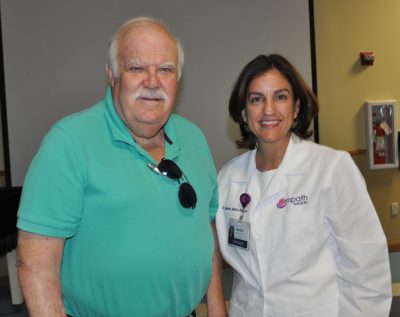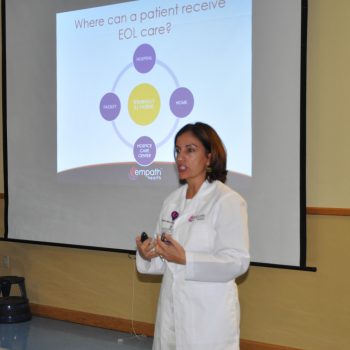
Caregiver Frank DeLuca meets Dr. Jerez-Marte.
We plan for many major life events – births and birthdays, weddings and anniversaries, education and graduations, vacations and retirement, and much more.
But what about circumstances that we tend to dread, like when health declines with you or your family? What kinds of care and support are available to help?
Our Suncoast Hospice Medical Director Jasmin Jerez-Marte, MD,HMDC recently spoke at the Dunedin Public Library about diseases, palliative care, hospice care and advance care planning. Almost all attendees are caregivers of loved ones with dementia or other long-term conditions.
Managing Conditions
Many people will be diagnosed with serious health issues in their lifetimes. Some common examples include cardiac, lung (COPD), kidney, psychological (bipolar disease, severe anxiety, etc.) and neurological (Alzheimer’s, Lou Gehrig Disease/ALS, etc.) diseases, cancer, opportunistic infections (flu) and falls.
The progression is unique for each condition.
“Most of us are going to deal with chronic diseases that we can’t cure but we can get under control. Every disease has its own trajectory. Shortness of breath is one sign that diseases are not under control. For cancer, the progression may be that you are receiving chemo or other treatment and find out if a tumor has progressed or been contained,” Dr. Jerez-Marte explained.
Different types of dementia cause different effects on the mind and body.
“Dementia comes in many flavors and some may cause decline faster. They all behave in different ways. Vascular dementia is unpredictable. It can be all over the place causing people to stop walking or feeding themselves,” she said.
 Asking Questions
Asking Questions
It’s important to have conversations with your physician and learn about the prognosis of a condition, outcomes of treatment and options for care.
“Talk to your doctor. Knowledge is power and the more you know, the more you can prepare for what’s ahead. You must explore your goals and fears. There are options and you should be in control and choose. It’s on you,” she noted.
Some questions to ask might be:
• Is the treatment curative or palliative? Is it going to cure or contain the disease?
• Is the treatment going to be worth it?
• How is the treatment going to make me feel?
• How will the treatment impact my quality of life?
Palliative vs. Hospice
Palliative care and hospice care are options for those who are living with chronic or advanced illnesses. Both include specialized teams that focus on treating the whole well-being and comfort of patients and supporting their family members.
Palliative care may begin as soon as a serious illness is diagnosed and may last for several years.
“If you have a serious illness that is causing pain and trouble functioning then you may need these services. A nurse practitioner, social worker and spiritual care coordinator can come out and make visits and offer pain management and support,” she explained.
Hospice care may begin when an illness advances and there is a prognosis of six months or less left to live.
“You have the right to the Medicare hospice benefit if you are age 65 years or older and are at the last six months of your life. Your physician can consent to hospice services and a nurse will evaluate you and then consult with a hospice physician. When you enter hospice care, you will be under the treatment of an interdisciplinary team of expert care professionals. Hospice not only treats the patient but also helps support the family in coping with the patient’s illness and limitations,” she said.
 Many types of hospice services are available to provide comfort and support.
Many types of hospice services are available to provide comfort and support.
Dr. Jerez-Marte added, “I like to say that there is no physical pain we can’t treat and that all depends on what your goals are. There are many ways to deal with pain, including medications. There are also other comfort services available, such as Reiki (energy work) and aromatherapy. It is not just physical pain, there can also be a lot of emotional and spiritual pain. As your goals evolve, we are going to meet you where you are. There are volunteers for support and up to 13 months of bereavement support for your loved ones.”
The goal is to bring the best possible quality of life up until the end of life.
“Don’t let these diagnoses take over your life. You have to find a way to still be functional. You can still do things that you enjoy and that nourish you. A happier patient has a better response to care,” she said.
Making Decisions
It’s also important to talk about your decisions with your physicians and families, put them in writing and choose a trusted person to speak your wishes.
She noted, “We see the best case scenarios and the worst case scenarios in health care. Some people have living wills and have it all sorted out and we have those who have absolutely none of that. We have advance care planning services. I know what I want and my husband knows what I want. Make those decisions today. Be in charge.”
Is it time for care?
Learn more about our palliative, hospice or advance care planning services that might help you. Call us at (727) 467-7423 or contact us online.

Dr. Jerez-Marte was an excellent speaker. One of the few who demonstrates a high level of knowledge while breaking it down for the appropriate audience. I would suggest attending her presentation on any topic next time that you have the opportunity.